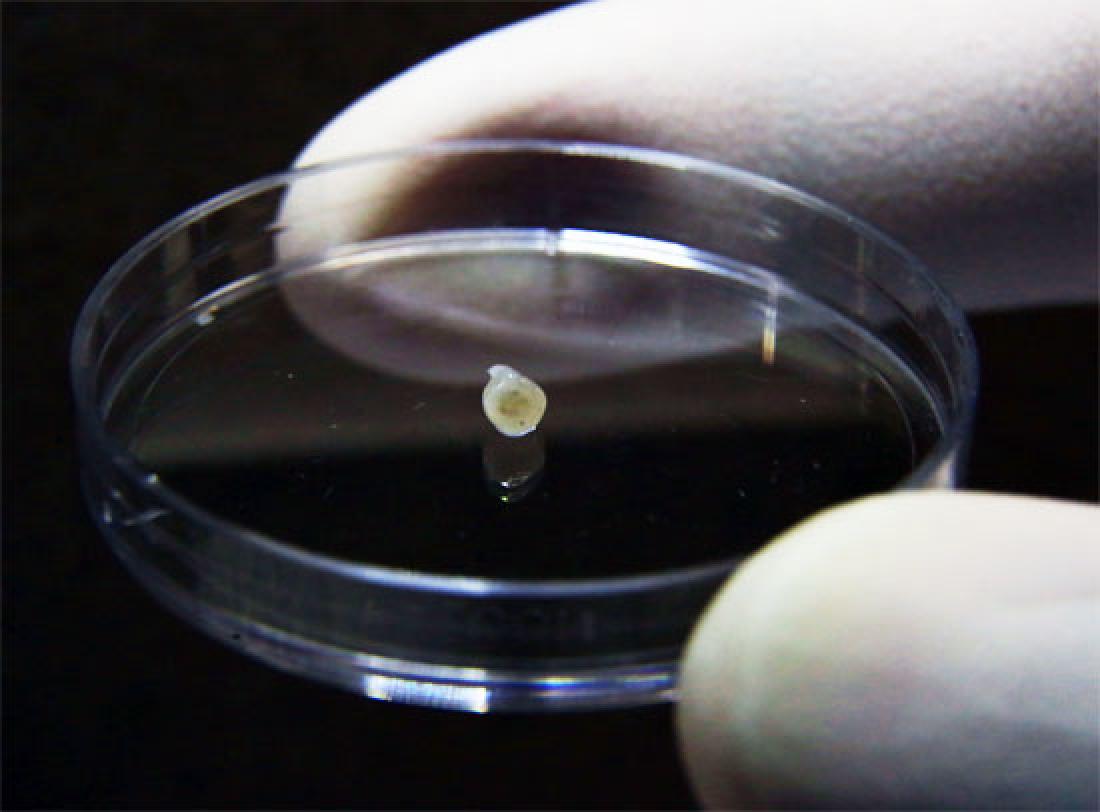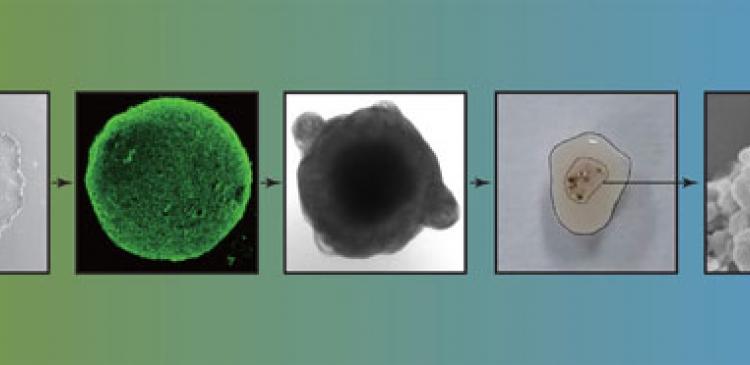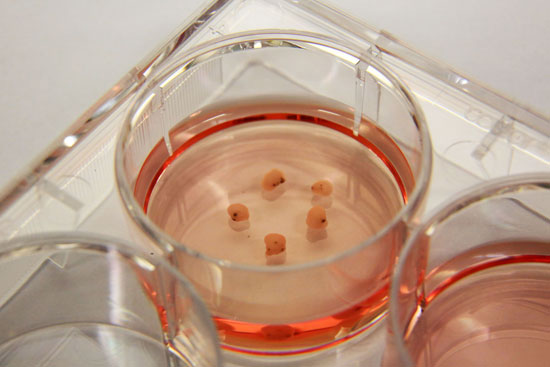A midbrain organoid in a petri dish. The black pigment is neuromelanin, a hallmark of the human midbrain.
SINGAPORE – Scientists in Singapore have made a big leap on research on the ‘mini-brain’. These advanced mini versions of the human midbrain will help researchers develop treatments and conduct other studies into Parkinson’s Disease[1] (PD) and ageing-related brain diseases.
These mini midbrain versions are three-dimensional miniature tissues that are grown in the laboratory and they have certain properties of specific parts of the human brains. This is the first time that the black pigment neuromelanin has been detected in an organoid model. The study also revealed functionally active dopaminergic neurons.
The human midbrain, which is the information superhighway, controls auditory, eye movements, vision and body movements. It contains special dopaminergic neurons that produce dopamine – which carries out significant roles in executive functions, motor control, motivation, reinforcement, and reward. High levels of dopamine elevate motor activity and impulsive behaviour, whereas low levels of dopamine lead to slowed reactions and disorders like PD, which is characterised by stiffness and difficulties in initiating movements.
Also causing PD is the dramatic reduction in neuromelanin production, leading to the degenerative condition of patients, which includes tremors and impaired motor skills. This creation is a key breakthrough for studies in PD, which affects an estimated seven to 10 million people worldwide. Furthermore, there are people who are affected by other causes of parkinsonism. Researchers now have access to the material that is affected in the disease itself, and different types of studies can be conducted in the laboratory instead of through simulations or on animals. Using stem cells, scientists have grown pieces of tissue, known as brain organoids, measuring about 2 to 3 mm long. These organoids contain the necessary hallmarks of the human midbrain, which are dopaminergic neurons and neuromelanin.
Jointly led by Prof Ng Huck Hui from A*STAR’s Genome Institute of Singapore (GIS) and Assistant Prof Shawn Je from Duke-NUS Medical School, this collaborative research between GIS, Duke-NUS, and the National Neuroscience Institute (NNI) is funded by the National Medical Research Council’s Translational Clinical Research (TCR) Programme In Parkinson’s disease (PD) and A*STAR. Other collaborators are from the Lieber Institute for Brain Development, the Johns Hopkins University School of Medicine, and the Nanyang Technological University.
Assistant Prof Shawn Je from Duke-NUS Medical School’s Neuroscience & Behavioural Disorders Programme said, “It is remarkable that our midbrain organoids mimic human midbrain development. The cells divide, cluster together in layers, and become electrically and chemically active in three-dimensional environment like our brain. Now we can really test how these mini brains react to existing or newly developed drugs before treating patients, which will be a game changer for drug development.”
Prof Tan Eng King, Research Director and Senior Consultant, Department of Neurology at NNI and Lead PI of the TCR Programme in PD, remarked, “The human brain is arguably the most complex organ and chronic brain diseases pose considerable challenges to doctors and patients. This achievement by our Singapore team represents an initial but momentous scientific landmark as we continue to strive for better therapies for our patients.”
GIS Executive Director Prof Ng Huck Hui said, “Considering one of the biggest challenges we face in PD research is the lack of accessibility to the human brains, we have achieved a significant step forward. The midbrain organoids display great potential in replacing animals’ brains which are currently used in research; we can now use these midbrains in culture instead to advance our understanding and future studies for the disease, and perhaps even other related diseases.”
This research is supported by the National Research Foundation Singapore under its Translational and Clinical Research (TCR) Flagship Programme and administered by the Singapore Ministry of Health’s National Medical Research Council.
[1] Parkinson's disease is a gradually progressive neuro-degenerative disorder which affects movement or the control of movement, including speech and body language. It affects about three in every 1,000 Singaporeans aged 50 years and above.
(Source: Ministry of Health, Singapore)
For media queries and clarifications, please contact:
Joyce Ang
Senior Officer, Office of Corporate Communications
Genome Institute of Singapore, A*STAR
Tel: +65 6808 8101
Email: [email protected]
Yen May Ong
Media Specialist, Communications
Duke-NUS Medical School
Tel: +65 6601 2057
Email: [email protected]
Cynthia Anne Victor
Executive, Corporate Communications Department
National Neuroscience Institute
DID: +65 6357 7162
Email: [email protected]
_____________________________________________________________
About A*STAR’s Genome Institute of Singapore (GIS)
The Genome Institute of Singapore (GIS) is an institute of the Agency for Science, Technology and Research (A*STAR). It has a global vision that seeks to use genomic sciences to achieve extraordinary improvements in human health and public prosperity. Established in 2000 as a centre for genomic discovery, the GIS will pursue the integration of technology, genetics and biology towards academic, economic and societal impact.
The key research areas at the GIS include Human Genetics, Infectious Diseases, Cancer Therapeutics and Stratified Oncology, Stem Cell and Regenerative Biology, Cancer Stem Cell Biology, Computational and Systems Biology, and Translational Research.
The genomics infrastructure at the GIS is utilised to train new scientific talent, to function as a bridge for academic and industrial research, and to explore scientific questions of high impact.
About the Agency for Science, Technology and Research (A*STAR)
The Agency for Science, Technology and Research (A*STAR) is Singapore's lead public sector agency that spearheads economic oriented research to advance scientific discovery and develop innovative technology. Through open innovation, we collaborate with our partners in both the public and private sectors to benefit society.
As a Science and Technology Organisation, A*STAR bridges the gap between academia and industry. Our research creates economic growth and jobs for Singapore, and enhances lives by contributing to societal benefits such as improving outcomes in healthcare, urban living, and sustainability.
We play a key role in nurturing and developing a diversity of talent and leaders in our Agency and Research Institutes, the wider research community and industry. A*STAR oversees 18 biomedical sciences and physical sciences and engineering research entities primarily located in Biopolis and Fusionopolis.
About Duke-NUS Medical School
The Duke-NUS Medical School (Duke-NUS) was established in 2005 as a strategic collaboration between the Duke University School of Medicine, located in North Carolina, USA, and the National University of Singapore (NUS). Duke-NUS offers a graduate-entry, 4-year MD (Doctor of Medicine) training programme based on the unique Duke model of education, with one year dedicated to independent study and research projects of a basic science or clinical nature. Duke-NUS also offers MD-PhD and PhD programmes. Duke-NUS has five Signature Research Programmes: Cancer and Stem Cell Biology, Neuroscience and Behavioural Disorders, Emerging Infectious Diseases, Cardiovascular and Metabolic Disorders, and Health Services and Systems Research.
Duke-NUS and SingHealth have established a strategic partnership in academic medicine that will guide and promote the future of medicine, tapping on and combining the collective strengths of SingHealth's clinical expertise and Duke-NUS' biomedical sciences research and medical education capabilities.
About the National Neuroscience Institute (NNI)
The National Neuroscience Institute (NNI) is the national and regional centre of excellence for treatment, education and research in the neurosciences. NNI offers over 20 clinical subspecialties and treat a broad range of conditions affecting the brain, spine, nerves and muscles. In the area of patient care, it provides clinical neuroscience services to various hospitals in Singapore. The Institute also coordinates and provides clinical neuroscience training, and is actively involved in conducting basic and clinical neuroscience research in Singapore.
NNI is a member of the Singapore Health Services (SingHealth) – a public healthcare cluster which manages two hospitals, five specialty centres and nine polyclinics.





